Tom's Hardware Verdict
The X300 Pro is a solid performer and a good HDD for workstations and desktops, especially when extra capacity and reliability are needed.
Pros
- +
Good performance, particularly at 12TB
- +
512MB of DRAM cache from 10-20TB
- +
Satisfactory 20TB pricing
Cons
- -
N300 Pro better priced at 12-18TB
- -
No standout features or support
Why you can trust Tom's Hardware
If you’re looking for a workstation or desktop HDD — after you've picked up one of the best SSDs for your primary storage, naturally — the Toshiba X300 Pro might be your best option. It offers a combination of high capacity, good performance, a solid warranty, and reasonable pricing, making it a good fit for more serious systems. Everybody loves SSDs, but you can’t beat the TB/$ value of an HDD, and you can only get so far with 8TB WD Blacks or Seagate FireCuda hard drives. We'll likely add it to our list of the best hard drives (for certain capacities), as it's good for content creators, developers, and other professionals that need a faster, larger drive that’s built to last.
We previously reviewed the Toshiba X300 14TB, a drive designed in the same vein but with weaker performance and a very limited 2-year warranty. It might suffice if you want more capacity than a standard consumer HDD can provide, but at that point shucking starts to look good. There are plenty of specialty drives that can fit the bill such as those designed for NAS, surveillance, or enterprise use. But NAS drives, like the Toshiba N300 Pro, are usually optimized for multi-drive environments, while surveillance drives will have firmware “AI” optimized for streams and image-related tasks.
Enterprise drives, like the WD Gold 22TB, often have special features like ArmorCache and a higher workload rate limit. All of these drives will work well in a workstation or desktop, but having the option of better performance across a range of capacities can be useful. The Toshiba X300 Pro and Toshiba N300 Pro provide just that, with a more relaxed workload limit in return for a lower price. Right now, the X300 Pro hits the sweet spot at its highest 20TB capacity, but its extra performance and cache at 10TB and up make it an interesting choice if its price matches or beats the N300 Pro in the 12TB–18TB range.
Toshiba X300 Pro Specifications
| Product | Toshiba X300 Pro | Header Cell - Column 2 | Seagate IronWolf Pro | Header Cell - Column 4 | WD Red Pro | Header Cell - Column 6 |
|---|---|---|---|---|---|---|
| Capacity | 12TB | 20TB | 12TB | 20TB | 12TB | 20TB |
| Model # | HDWR51CXZSTB | HDWR62AXZSTB | ST2000NE0008 | ST20000NE000 | WD121KFBX | WD201KFGX |
| Pricing | $259.99 | $354.99 | $219.99 | $399.99 | $259.99 | $379.98 |
| Cost per TB | $21.67 | $17.75 | $18.33 | $20.00 | $21.67 | $19.00 |
| Interface | SATA 6.0 Gbit/s | SATA 6.0 Gbit/s | SATA 6.0 Gbit/s | SATA 6.0 Gbit/s | SATA 6.0 Gbit/s | SATA 6.0 Gbit/s |
| Form Factor | 3.5" | 3.5" | 3.5" | 3.5" | 3.5" | 3.5" |
| Technology | CMR | CMR | CMR | CMR | CMR | CMR |
| RPM | 7,200 | 7,200 | 7200 | 7200 | 7200 | 7200 |
| Sustained Transfer Rate | N/A | N/A | 240 MB/s | 285 MB/s | 240 MB/s | 268 MB/s |
| Cache | 512MB | 512MB | 256MB | 256MB | 256MB | 512MB |
| Operating Power | 7.38W | 7.30W | 7.8W | 7.7W | 6.0W | 6.9W |
| Noise | 20dB (idle) | 20dB (idle) | 20dBA (idle), 26dBA (seek) | 20dBA (idle), 26dBA (seek) | 20dBA (idle), 36dBA (seek) | 20dBA (idle), 32dBA (seek) |
| Workload Rate Limit | 300TB/yr | 300TB/yr | 300Tb/yr | 300Tb/yr | 550 TB/yr | 550TB/yr |
| MTBF | 1M hours | 1M hours | 1.2M hours | 1.2M hours | 2.5M hours | 2.5M hours |
| Warranty | 5-Year | 5-Year | 3-Year | 5-Year | 5-Year | 5-Year |
The X300 Pro is available from 4TB to 20TB but the point of such a drive is capacity, so we’re looking at the 12TB and 20TB models today. Like the NAS-centric N300 Pro, the X300 Pro has 512MB of DRAM cache from 10TB and up, which is more than much of the competition. This can help with many workloads and provides a larger buffer for small writes. Unlike the N300 Pro, the X300 Pro is not optimized for NAS environments with multiple drives but is instead intended for workstations and high-end desktops. It maintains the 5-year, 300TB/year warranty that should be sufficient for such systems.
The X300 Pro is, in effect, equivalent to the N300 Pro, which potentially makes it the better choice for many users at 20TB. It competes directly with the Seagate IronWolf Pro, which currently costs more, but with a lower data write limit than the WD Red Pro, which also costs more. If you're really going to write over 300TB to one of these drives, the WD Red Pro could warrant the added cost, but for most users that's a non-issue.
As always, it’s important to keep an eye on prices and settle on a desired capacity. If you need more than 10TB you can’t rely on general consumer drives. You can potentially shuck external HDDs, but if you want a more reliable solution, the X300 Pro could be a good choice.
Software and Accessories
Toshiba is more focused on getting the drive to your door than providing a full suite of software — software that's often unnecessary and unwanted for a lot of people. There are a plethora of free and paid applications available to monitor and maintain your storage drives. While toolboxes or Acronis True Image — or their equivalent — are nice to have as downloads, they're more useful for less-professional storage solutions.
The X300 Pro is designed for content creation and workstation use where management will be more rigorous. This does mean that the X300 Pro should undercut the competition a bit on price, though. Looking at current prices, the 20TB model hits the mark at just $17.75 per TB, while the 12TB model costs more than the IronWolf Pro 12TB.
A Closer Look
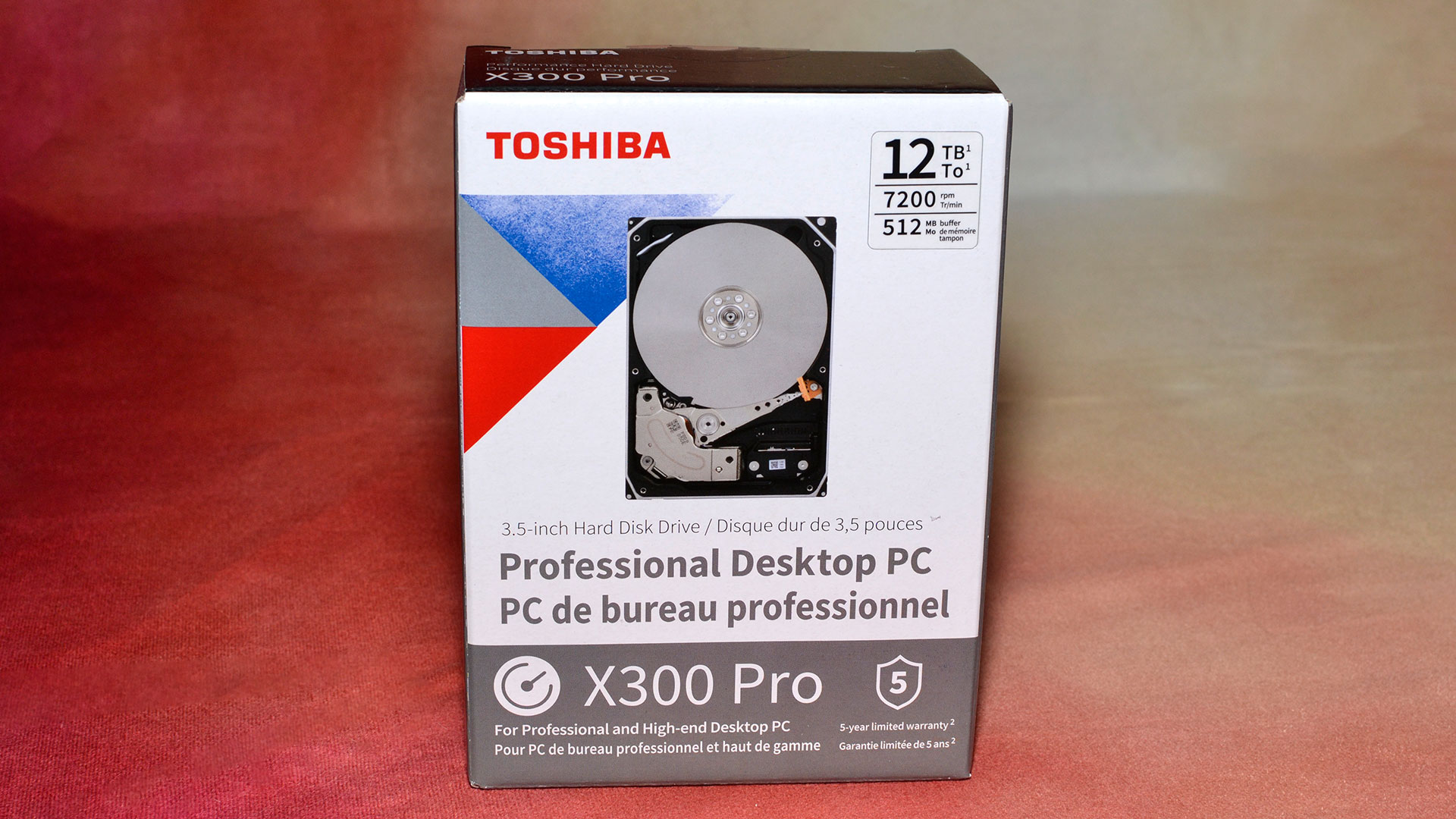
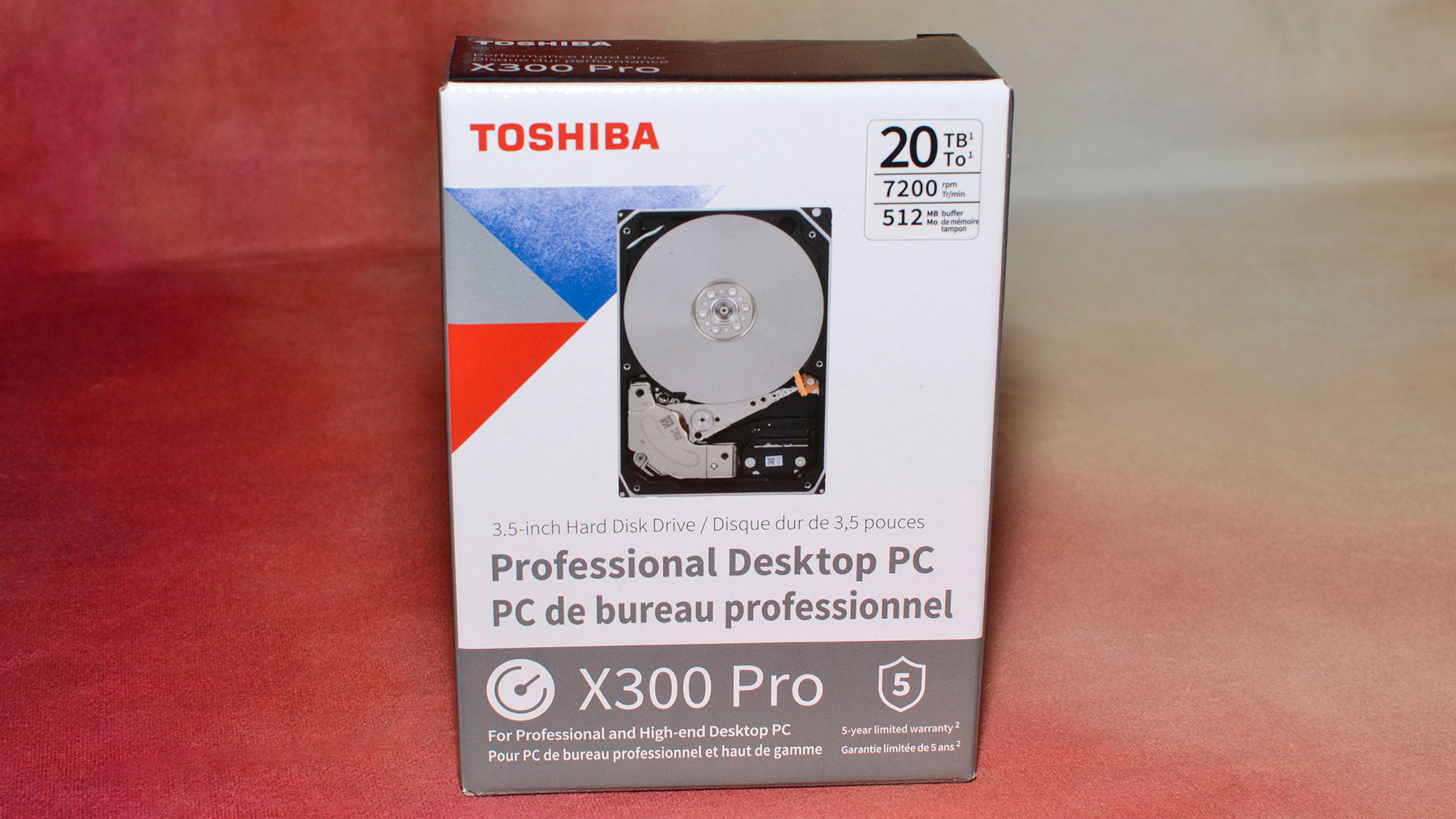
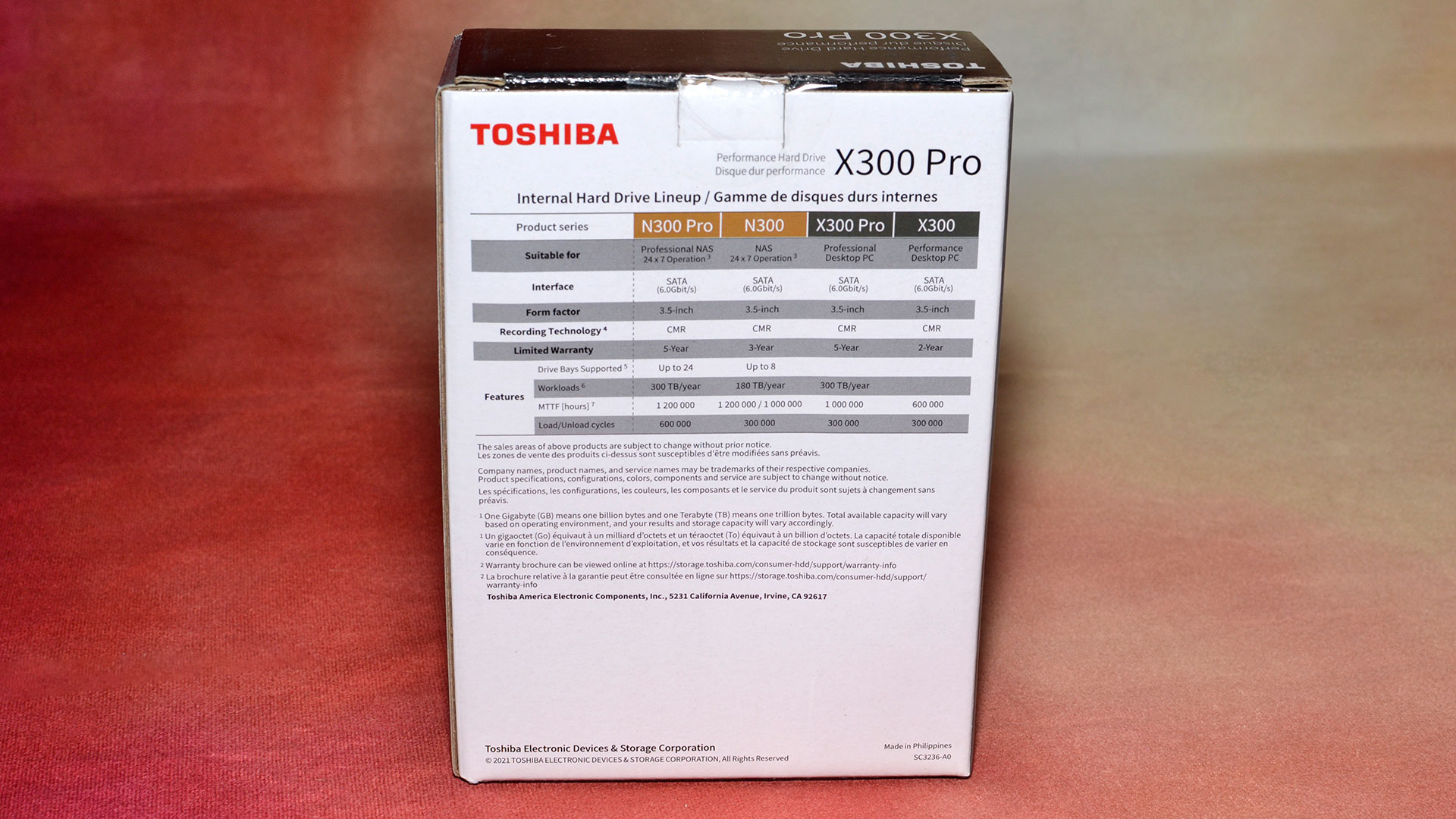
Toshiba helpfully includes a table on the back of the product box comparing the N300, N300 Pro, X300, and X300 Pro. The X300 technically fills the same role as the X300 Pro, but it has a much weaker warranty and no guaranteed workload rate limit. We were underwhelmed by that drive's performance, but we were happier with the N300 and N300 Pro.
The X300 Pro matches up well against the latter, which is designed for multi-bay NAS. If you're just looking for a single drive and don't intend to run it in a NAS, the X300 Pro should be a good choice for serious machines that need high storage density.
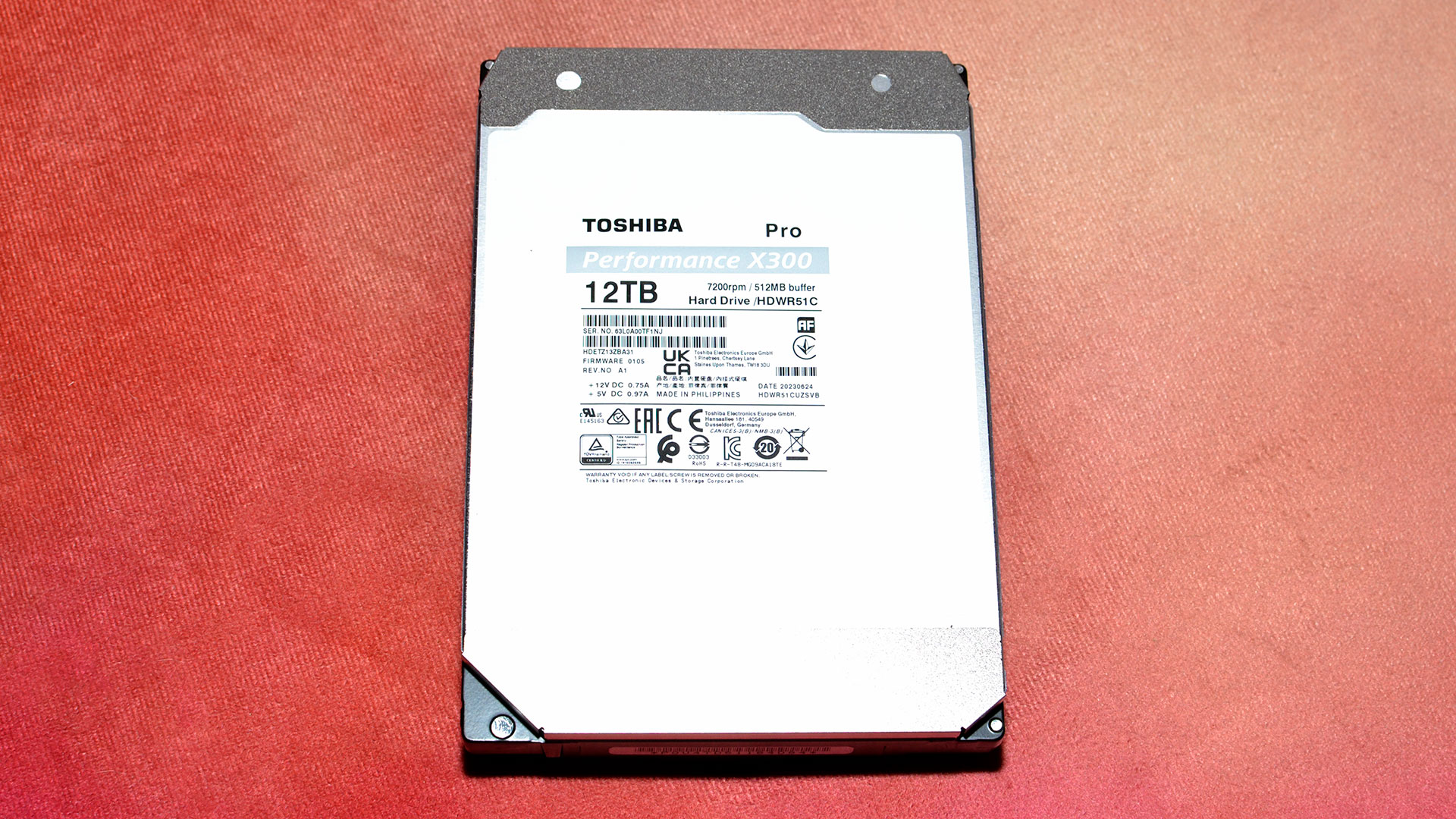

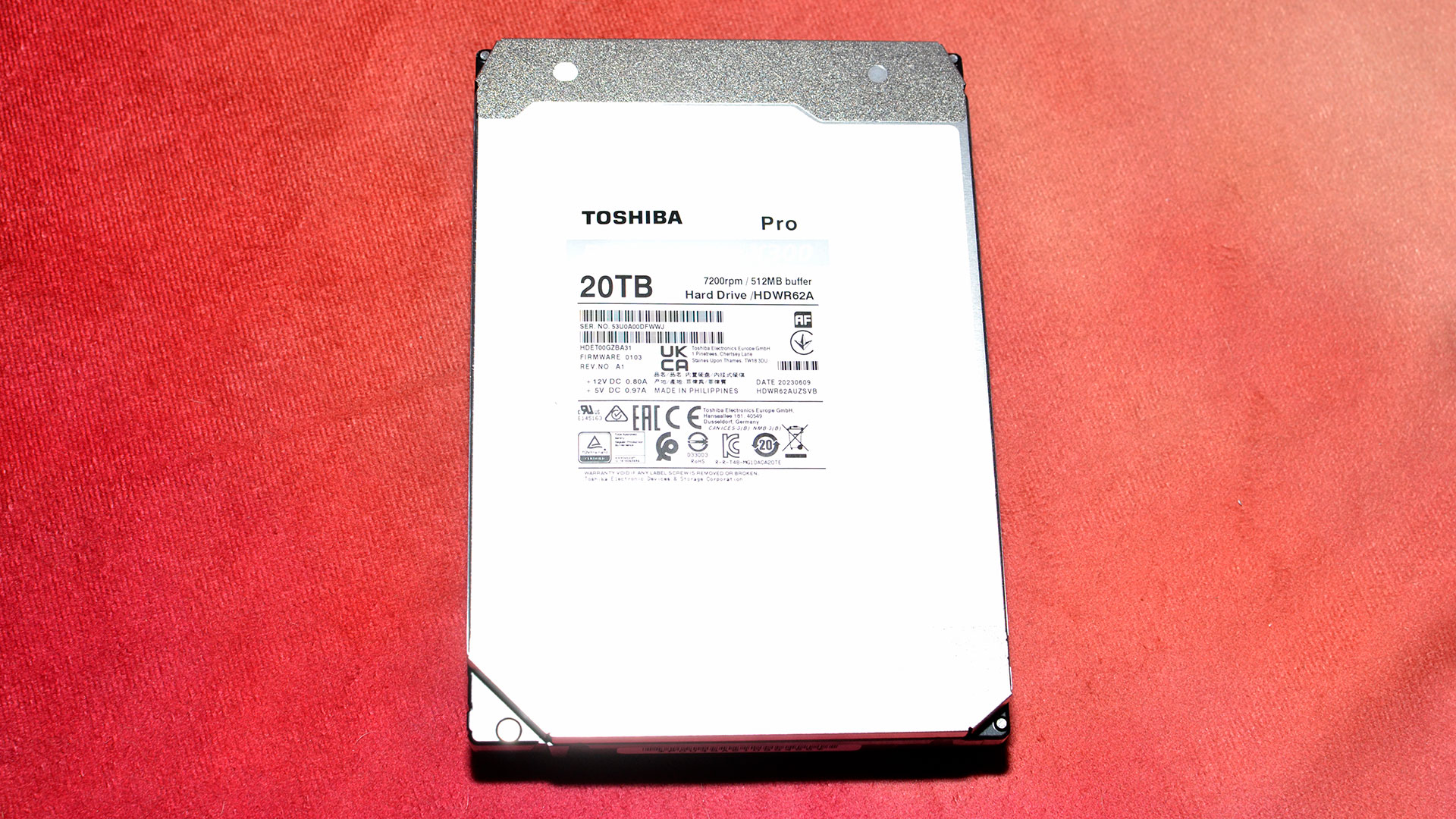
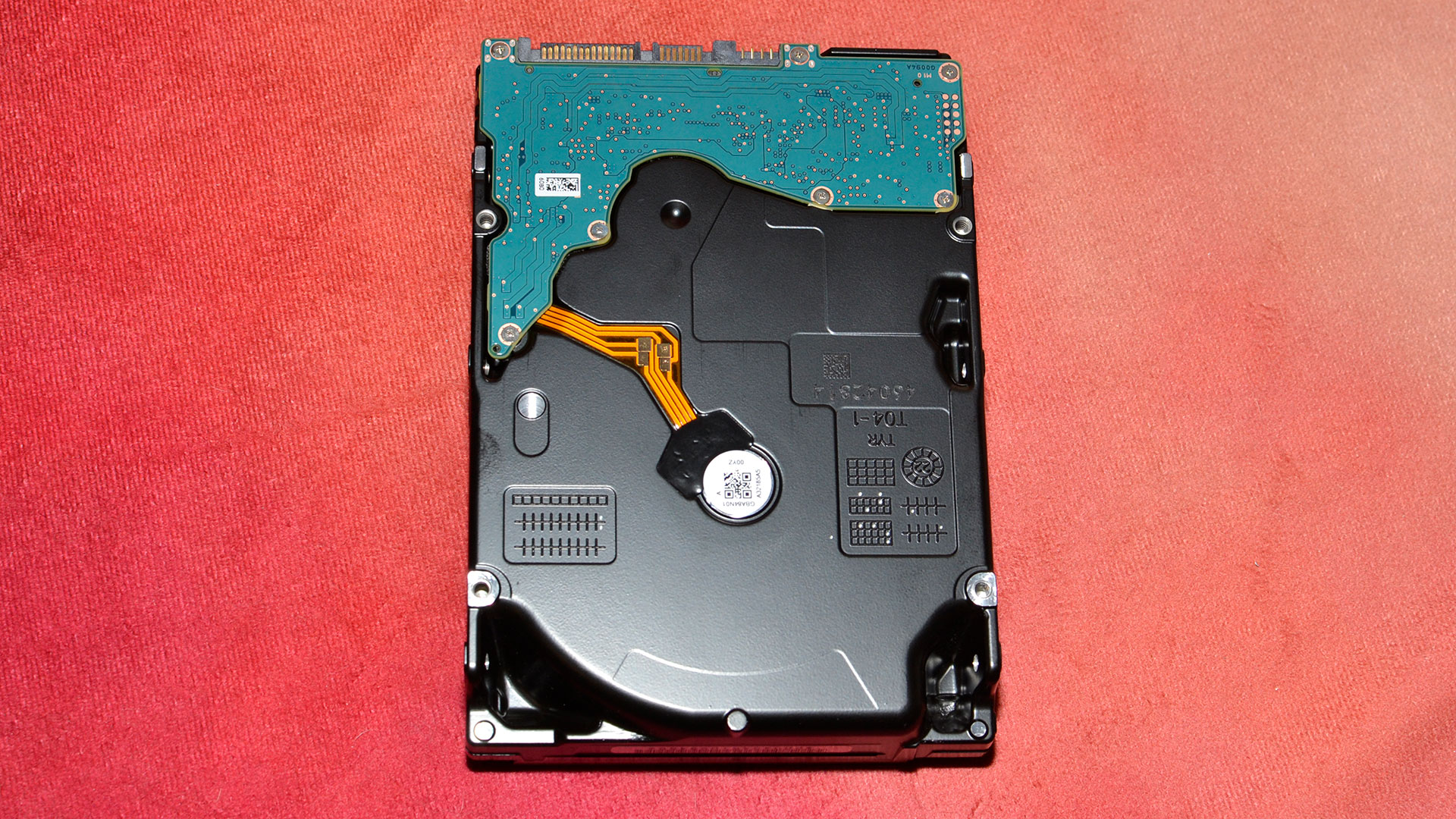
Toshiba’s color coding has a silver or gray label for workstation HDDs in contrast to a dark beige or tan for NAS. The hard drive is otherwise unexceptional, although we point out that the 12TB does have 512MB of DRAM cache. The IronWolf Pro and Red Pro are stuck with 256MB at that capacity. Those two drives - the IronWolf being the 300TB/year SKU - also have a sustained transfer rate cap of 240 MB/s while the X300 Pro should be able to match the 12TB N300 Pro’s 281 MB/s. These attributes can give Toshiba a leg up with performance at certain capacities which is why we liked the N300 Pro at 12-18TB, but as always it comes down to price.
MORE: Best Hard Drives
MORE: Best SSDs
Get Tom's Hardware's best news and in-depth reviews, straight to your inbox.
MORE: How We Test HDDs And SSDs
- 1
- 2
Current page: Toshiba X300 Pro Features and Specifications
Next Page Toshiba X300 Pro 12TB and 20TB Performance Results
Shane Downing is a Freelance Reviewer for Tom’s Hardware US, covering consumer storage hardware.
-
Sleepy_Hollowed Wow, these are literally better in every way to the lower price ones except in price alone.Reply
They’re going in my list and thanks for the great review! -
atomicWAR Honestly I think it is tough to compete, atm at least, with Seagate Exos x20 drives at higher capacities. I frequently see their 20TB drives at or below the cost of other solutions, even those with far less capacity (ie seen 20TB drives cheaper than 12TB drives). I have picked up 9 this year alone when they hit the 269.99 price tag on newegg (typically 309.99 though msrp is 699.99). But I am always happy to see more high capacity drives hit the market. I can't wait for 50TB drives...Reply -
JarredWaltonGPU Reply
I think we should start seeing 28/30 TB drives in 2024. Or at least I hope so! Not that I really need that much storage personally. I do have quite the collection of tested HDDs and SSDs sitting in my office now, though! LOLatomicWAR said:Honestly I think it is tough to compete, atm at least, with Seagate Exos x20 drives at higher capacities. I frequently see their 20TB drives at or below the cost of other solutions, even those with far less capacity (ie seen 20TB drives cheaper than 12TB drives). I have picked up 9 this year alone when they hit the 269.99 price tag on newegg (typically 309.99 though msrp is 699.99). But I am always happy to see more high capacity drives hit the market. I can't wait for 50TB drives... -
mdd1963 Only just now ordered a trio of 10 TB WD Red Plus drives, so will either do a Mirror plus one more copy (totaling 20 TB w/ 3 drives), or perhaps a striped array through Storage Spaces as long as adjust the cluster size from 4k up to something higher than the classic striped array Storage Spaces throughput of a staggering 32 MB/sec...! :) (If unsuccessful in getting stripe speeds up to something semi-normal for a trio of striped drives, realizing that writes will take a hit over reads of course due to parity, then I'll revert to just a mirror, with an additional copy, which oddly enough can also be done in Storage Spaces as well with adding another drive to a mirror, where apparently SS simply staggers it's 2 copies of files semi-evenly to balance the storage amongst the 3 drives. Will tinker with read/write results from/to un-cached file transfers to see which is best.Reply
(The article was correct, the price on 20 TB Pro X300 looked nice! Might pick one of those up too, but, I expect the trio of 30 TB raw to last me a while, considering how long a smattering of external USB-connected drives have lasted, with the largest being a 3 TB Toshiba, and it being only some 30% full! I have anything truly important also backed up to multiple free cloud accounts.)
Sidenote: any else trying TerraBox? Free 1 TB? Seems to work fine the 3 weeks I have been tinkering with it! 1 TB for free users sure beats most classic/well established competitors with their paltry 5, 10, 30 GB free storage limits, etc...)